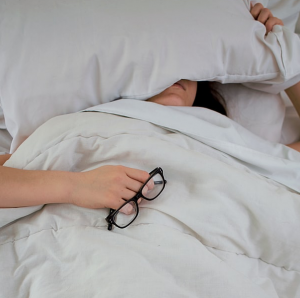We have all been there—twisting and turning, our minds racing, not able to fall asleep. It sets the tone for the next day.
Struggling to fall asleep, stay asleep, or feeling sleepy throughout the day can be more than just annoying—it can be harmful to our physical and mental health. Sleep problems are common, an estimated 50-70 million Americans struggle with some type of sleep-related problem.

Sleep and Brain Health
Sufficient sleep (between 7-8 hours for most adults) helps the brain to properly process emotional information. During sleep our brains are ramped up or down to enable better thinking, learning, and memory. Lack of sleep can be harmful to the brain’s processing of emotional information, impacting mood and emotional reactivity—contributing to many mental health disorders.
Not being able to sleep can both be caused by a mental health disorder—anxiety, for instance— and can cause mental health problems—depression, inability to focus, eating disorders, suicidal thoughts/behaviors, etc.
The bottom line is sleep is crucial to your mental and physical wellbeing. So, what can you do to improve your sleep and create healthier sleep habits?
Creating Healthier Sleep Habits
If you frequently struggle with falling asleep or staying asleep, there are a variety of ways to change your behavior and develop healthier sleep patterns. It is often referred to as sleep hygiene — just like taking a shower or brushing your teeth.
1.) Make a Sleep Schedule and Stick to it—Having the same go to bed and wake up times each day can help your body to get into a sleep/wake rhythm. Figure out what works for your schedule and make a plan. Maybe that means a 10 p.m. bedtime and a 6 a.m. wake up, or 11 p.m. and 7 a.m.

2.) Wind down —It is hard to go from 100 to 0 in a matter of minutes. Instead, create a wind-down plan for your evening to get you primed for sleep. Relaxation techniques like breathing tools, meditation, taking a bath, reading a book, listening to music, are all helpful.
3.) Avoid Stimulants — That after-dinner cup of coffee might sound delicious but make sure you go for decaf. It is important to lay off the caffeine, tobacco, and other stimulants leading up to bedtime. Alcohol may make you fall asleep but it isn’t helping you stay asleep and your quality of sleep after drinking (even if it’s just one glass) is not going to be great.
4.) Put the Screens Away — Reading on your phone may be your nightly ritual but looking at the screen is making it harder for you to fall asleep. Try to make a no-screen rule at least an hour before bedtime to give your eyes and your brain a rest. Dimming the lights leading up to bedtime can also help to calm things down.
5.) Move During the Day— Your body craves movement. It needs to be active. Try to get some kind of exercise (even if it’s just taking the stairs at work) and get outside as much as you can during daylight hours. Exposure to natural sunlight helps set your body’s natural rhythm.

6.) Maximize Comfort — Make sure your room is warm or cool enough to keep you comfortable. Invest in comfy pillows, sheets, and blankets to make your bed a haven for rest.
7.) Shut out Light and Sound — It is hard to get good sleep if you have a bright light shining on you or disturbing sounds (that is why it is best to turn off the TV).
8.) Get Help — Cognitive Behavioral Therapy (CBT) can be an effective tool for treating insomnia and other mental health disorders. It is a form of talk therapy that works by examining patterns of thinking and reformulating negative thought patterns in new, more positive, ways.
It may take some trial or error to figure out what works for you, but in the end, your body and your mind will thank you.
Ready to begin counseling in PA?
The professionally trained and licensed counselors at Rooted & Rising Therapy in Pittsburgh have openings. Our practice specializes in treating individuals through years of experience, we’re confident that no problem is too great to overcome. Through therapy, there is always a way to address the issues you face and learn coping strategies to help you both right now and in the future. Just call our office at (412) 228-8489 or email us at info@rootedandrisingtherapy.com to get started to feeling better today. We are here for you.